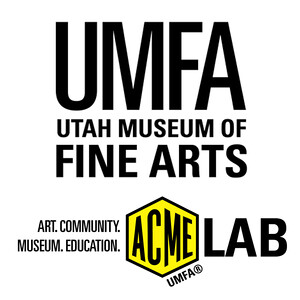MIRROR | MASK
A self-reflecting exhibition in the ACME Lab
August 16–December 9, 2018
Marcia and John Price Museum Building
410 Campus Center Drive
Salt Lake City, Utah 84112-0350
United States
Hours: Tuesday–Saturday 10am–5pm,
Wednesday 10am–9pm
T +1 801 581 7328
F +1 801 585 5198
The Utah Museum of Fine Arts (UMFA) brings yet another thought-provoking installation to the ACME Lab, the Museum’s interactive exhibition space. MIRROR | MASK, by New York City-based artist Marisa Morán Jahn, uses sculpture, performance, photography, GIFs, and video featuring mirrored masks to explore how we see ourselves reflected—and distorted—in others, and ideas of identity, presentation, and self-reflection.
Influenced by the way masks function in Asian, African, and Greek rituals and dramaturgy, Jahn’s new work also questions Western modes of self-presentation in an era of ubiquitous digital screens and mirrors. MIRROR | MASK meditates on how we see the Other within ourselves and have presented ourselves throughout history. “By virtue of the fact that they both conceal and reveal, masks can be liberatory, allowing us to fashion, inhabit, and reclaim other kinds of agency,” Jahn says.
Jahn’s masks interact with artworks in the Museum’s exhibitions of ancient Egyptian, traditional African, and contemporary art by women. The exhibition begins with Jahn’s work juxtaposed with two works she selected from the Museum’s permanent collection. All three depict human subjects that blend and dissolve into their surroundings. This phenomenon echoes what Sigmund Freud calls “oceanic,” a term he used to describe the feeling of being engulfed within a larger whole.
Jahn’s Three Sisters mask and GIF sit adjacent to the work of modern and contemporary women artists. The archetype of three sisters is common in stories and ancient religions throughout the world. Jahn created Three Sisters with and for women. “The masks are a way to envision the incredible power of women working in solidarity—not only on behalf of our peers but those who came before and will come after us.”
The Driver, a depiction of a boat driver wearing a featureless mirrored mask, is exhibited alongside funerary objects from Egypt. The photograph emulates the belief in many cultures that the dead cross rivers such as the Nile, Styx, Sanzu, or Vaitarna to transition to the afterlife.
A video by Jahn in collaboration with artists and filmmakers from Uganda, The Transition features a masked man cutting his hair while looking at himself in a mirror—a contemporary rendition of the proverbial haircut marking, or perhaps bringing about, the change from one state to another. This video is placed alongside other traditional nineteenth- and twentieth-century masks from cultures around Africa, many which were created to initiate and commemorate transitions from childhood to adulthood, life to death.
The bulk of Jahn’s work is on view in the ACME Lab, where photographic portraits taken in Central Asia and Jahn’s own neighborhood present intriguing narratives that hover between the quotidian and the mythic. An installation invites visitors to peer into a darkened room and view the masks illuminated by pinlights to create a hallucinatory and haunting effect. Visitors can also explore the themes of concealment and personae by putting on a mirrored mask and taking a selfie in front of a backdrop Jahn created.
Of Chinese and Ecuadorian descent, Jahn is an artist, multimedia designer, educator at MIT and The New School, and the founder of Studio REV-, a nonprofit organization involving public art and creative media with low-wage workers, immigrants, women, and youth. Jahn’s work in MIRROR | MASK is supported by Creative Capital.
MIRROR | MASK is curated by Virginia Catherall, UMFA curator of education, in collaboration with Jorge Rojas, director of education and engagement, and Emily Izzo, ACME coordinator. ACME Lab is an innovative space in the Museum’s Emma Eccles Jones Education Center dedicated to community engagement and art experimentation. This exhibition and ACME Lab is made possible, in part, by a generous gift from The JoAnne L. Shrontz Family Foundation.


